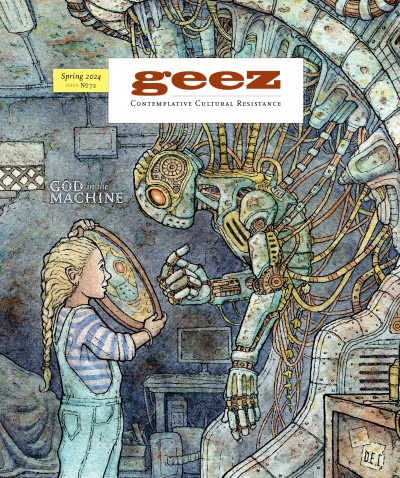The Future is Hybrid

Detail of "AI Pastor" by Darryl Brown
The email simply read, “Have we ever considered a purely online church?”
The email was sent in response to the calls of distress coming from across the church: what will we do in a world with limited physical interaction? How will we survive when all we’ve known is ministry with physical proximity? How will we manage?
It may have even just been the subject heading; no body to the message. Perhaps a fitting format for what the pandemic brought on: floating heads on electronic meetings with disembodied speech.
But I think that would be a disingenuous characterization, at least in my experience. For while the global pandemic we’ve all been reeling from (I don’t dare quite say “recovering” yet because I’m not convinced society is or has), it was a mini-apocalypse that pulled back the facades that we had all been living under with institutions that promised security, longevity, invulnerability. It did what all apocalypses do.
It unveiled some deep truths.
Deep truths concerning the fragility of our institutions, including the church.
Deep truths concerning the underlying loneliness of humanity that didn’t suddenly appear during the pandemic, but was certainly accentuated by the crisis.
Deep truths concerning the insufficiency of our abilities to cope with the huge human record-scratch trauma that a global pandemic put on us in these times.
The pandemic was apocalyptic in the truest sense of the term. Into this revelation, we started wondering what might happen if we breathed into this landscape a digital-first, Christocentric community? A community that took the medium of technology as primary for proclamation, not a secondary consideration? After all, I think we’ve all watched enough recorded worship services to understand that the worship experience church leaders were trained to provide doesn’t translate well to the digital space.
No recorded live-worship is “awesome” in the literal sense of the word “awesome.”
Anam Cara Community, a collaboration of slightly disaffected church leaders and hopeful voices that comprise our community and curators, was born out of a desire to honor not only the cracks in our human experience that the pandemic highlighted, but also to honor a Divine presence that has always been mediated through the available materials: wine, bread, water, spoken word, written word, radio, television, fiber optic cable, and digital media.
Three distinct advantages have proven themselves with this pivot to a digital-first community.
Accessibility
One of the amazing advantages that Anam Cara Community, and other similar “digital first” communities have, is the ability to reach anyone, anywhere, any time. Many of us have friends and family members who have proclaimed with finality, “I’ll never darken the door of another church!”
And they mean it.
Anam Cara Community provides no such barrier. You get to sit anonymously on our back pew any time you’d like. This, of course, brings some problems, too. Without making yourself known, the curators will never know who you are, what you need, or why you’re deciding to make the spiritual leap to check things out. But if given the choice between the barrier of the church door, and the barrier of “follow” to make yourself known, we’ve chosen the follow.
The digital space allows us access to not only have people engage with us at their readiness, but also be perpetually accessible. Our content will, potentially, live on in perpetuity, and therefore continue to do what our ultimate goal is: reach people with some good news.
Diversity
Anam Cara Community is able to offer what we call a “constellation of offerings.” We have a regular short-form podcast that digs deeply into the lectionary for any given Sunday. We have online worship experiences to engage the senses as well as the soul. We have a blog that enriches spiritual lives through thoughtful content.
We’re able to offer a lot, regularly, that many brick-and-mortar communities struggle to produce. We do so with the medium as first and foremost in our minds.
We’re able to highlight diverse thought-leaders through these diverse offerings. We have a guiding principle that encourages us to be mindful of diversity in our voices. With this mindfulness, we’re able to regularly connect listeners, worshipers, and readers with a spectrum of voices from across the world. The apocalyptic pandemic shrunk the world, and we’re utilizing that leverage to introduce voices into the resulting empty space that so many would not have had access to previously.
Attending to the Rhythm of Life
Church attendance has been changing.
Whereas a “regular church goer” was every week, this next generation’s “regular” is once or twice a month.
There are a number of reasons for this, the least of which is the rampant hypocrisy running through most all supposedly moral institutions, including the church writ large. Other reasons seem to revolve around an evolving rhythm of life that we are living into. Weekends are no longer the optimal time for intentional spiritual growth for many. Many people connect spiritually in places outside of a typical liturgical service.
Perhaps, humanity is newly awakened to the fragility of life, and so time is at a premium these days. Perhaps it is becoming increasingly true that we are more fully aware of how we spend our days is how we spend our lives, and we’re refusing to spend our lives on things that don’t enhance meaning in them.
Spirituality is important. We’re finding ways to grow and develop spiritually, just in new ways and new rhythms.
Anam Cara Community’s format adapts to these new rhythms of our individual and shared life, providing the scaffolding for a spiritual encounter that is ever-ready, ever-green, and ever-nimble. This medium also tends to the new rhythms of pastoral life, allowing the curators of Anam Cara the flexibility to contribute to the world in a number of ways through other vocations, allowing Anam Cara to organically take shape. There is no rush to create content or attract followers. Rather, there is a slow and steady pace of making what feels right when it feels right.
The rhythm of life, when well attended, is an ever-flowing well-spring that can counteract the burnout we’re seeing in so many congregational and clergy corners.
Next Steps?
As the most recent pandemic wanes, there will be a bit of a backlash, a call for “in-person only!” engagement. That is certainly expected and warranted. Face-to-face interaction cannot be replicated through a digital medium in a way that is identically satisfying.
That being said, an experience that takes the medium as primary, a “digital first” experience, can also not be replicated in a way that is satisfying through other means.
I believe the future of the church will be through at least three branches.
Some communities will form in-person, some will be digital first, and some will be a hybrid of the two, honoring the new rhythms that humanity is living into as we both embrace a renewed freedom to explore the world while also honoring the vast reach of digital mediums that expand our horizons past geographical restrictions.
The future is hybrid, Beloved.
Tim Brown is a pastor in the Evangelical Lutheran Church in America and currently helps curate Anam Cara Community, a digital-first offering. He lives in Raleigh, North Carolina with his wife and two sons. He can be found at a coffee shop or brewery reading or writing something he thinks is interesting.


Start the Discussion